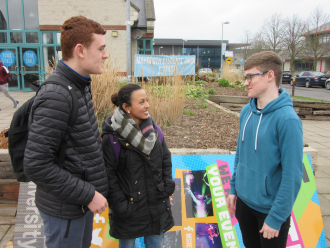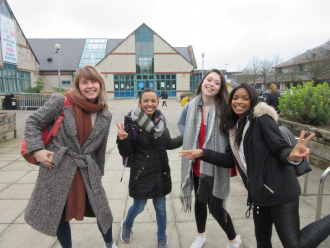International Development is about
- the development of people and countries, about the relations between them, and about the social, economic, political and cultural factors which lead to development, underdevelopment or overdevelopment in our world today
- our world, how we live in it and the future we need to create
- global sustainability, equality, human rights and social justice
- the challenges we face and how we overcome them as active citizens in the world
The subject of international development focuses on
- global issues
- enabling people to critically engage in learning for a better world – a world of equality, sustainability, diversity, respect and justice for all.
- the work of the Sustainable Development Goals (SDGs) (provide link to the SDGs) that all countries have signed up to as the pathway to a sustainable future. Find out more about the BA modules in international development here
Students engage with
- a wide range of contemporary issues which impact on development around the world. These include racism, trade, gender equality, the environment, migration, fast fashion, conflict, humanitarianism, and climate justice.
- the challenges we face in our world today and skills and ways of dealing with them. Whether it’s activism, policy or social media campaigning, or about working with government bodies or with business, students get a deeper insight into how they can shape a better, brighter and more equal future for everyone.
Graduates work
- in international development agencies or in organisations in Ireland which are involved in education and campaigning work on global development issues
- with business – in fair trade and as social entrepreneurs
- with governments and international bodies such as the UN, in shaping the future of our world
- in humanitarian and conflict contexts, with refugees or on human rights
- in community development and global education, in activism and on policy analysis
Combining international development with other subjects, students can begin to specialise in areas of particular interest, e.g., linking business and human rights or ethical social enterprise; or linking geography and urban planning with concerns about equality and poverty-related issues at local and global levels; linking a language with international development for a future career in another country or in teaching; or linking media studies or marketing with international development for a future career in social media, promotions or fundraising.
Many start off as volunteers, as engineers or interested in business, and then they become more specialised in areas such as policy, programme development, working with young people or in community development. (link to testimonies)
We are only starting to understand the depth and breadth of the challenges which face the future of humanity.
People, and young people in particular, are more and more interested in acting sustainably, in supporting refugees and asylum seekers and in creating more equal, just and respectful societies. They really do want to create a fairer world.
But many people feel they don’t understand enough about the forces shaping our world or what they can do to make things better.
Studying international development gives students the know-how and skills to integrate their concern for the future of our world with their career-choice. Understanding more, and learning more about global poverty and inequality, and about our own role in relation to them, helps learners to understand how they can contribute in important and hopeful ways.
There’s lots of reasons why people study international development. Our students tell us that one of the things they learn is to how
to ask questions – not to take things for granted, and
they learn what makes a difference.
For example, many people think that international development is all about charity, about what we do to help people in the so called ‘developing countries’. They don’t realise that charity is only the tip of the iceberg and that changing policies, laws and changes in our lifestyles, as well as supporting countries to do things for themselves, and not blocking them from doing so, can be much more beneficial. We can see this with issues around global vaccine equity, around systems to ensure financial justice, in relation to implementing the SDGs and in terms of anti-racism, LGBTQ rights and gender equality around the world.
Another reason students like international development is that they learn that international development is about what happens everywhere. It’s about all of us and the decisions and policies made in Ireland and in Europe which affect other countries in the world. It’s about what’s happening here too. It’s about how we live and our impact on people in other countries, e.g., in terms of global climate justice or the migration policies in Europe which affect people fleeing conflict in Syria or Afghanistan, while most refugees are looked after in the poorest countries in the world.
Learning more about international development, and doing so in a more critical way, can shift our lens away from worrying about what’s happening to focusing on how we can act more in solidarity with others in everything we do. Once we understand that we have an impact on others, that we can do things in our lives which make a difference – what we eat, what we use, who we vote for, how we behave towards others etc - we can start to relate to people in the world more actively, more humanly as part of the same wider world. As we understand more and learn skills for creating change, learning from others who are active and involved in changing things for the better, we realise that we can be part of creating a better global future. That’s a huge part of why many people value studying international development. We all need hope. Through learning to contribute to improving our world, international development can give us the skills and the means to shape a more inclusive, equal, just and hopeful future.



